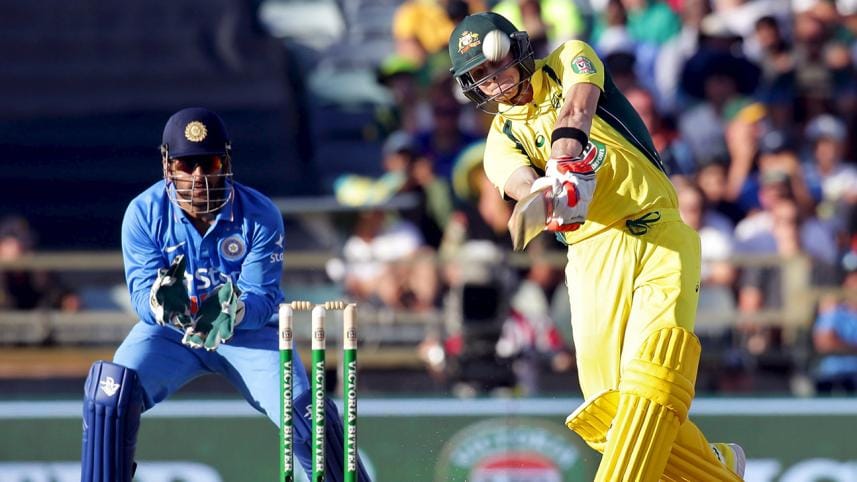Smith and Bailey brush off India's 309

If this is summer's main course, then Steven Smith and George Bailey wasted no time at all tucking in. A batsmen's battle unfolded between Australia and India at the WACA, with the hosts seeing a 207-run stand between Rohit Sharma and Virat Kohli before raising it through the match-defining union between Smith and Bailey, worth 242.
Things could have been very different had Bailey been given out caught behind when, sporting a new closed batting stance, he swivelled to pull the debutant Barinder Sran and gloved to MS Dhoni in the fifth over. India's appeal was not altogether convincing, Richard Kettleborough gave the benefit of the doubt, and as Bailey said afterwards: "Would've been interesting to see on DRS, but we're not the team that doesn't want it." Already the series has some spice.
From that point, Bailey and Smith took impressive control to counter the early losses of Aaron Finch and David Warner, both victims of the tall left-armer Sran's decidedly useful opening spell. Bailey, and then Smith, chose to target the spin of R Ashwin and Ravi Jadeja, hitting cleanly and straight, before the captain put on afterburners, rarely seen previously, to take Australia comfortably home.
Steve Smith and George Bailey both hit classy centuries to help Australia beat India by 5 wickets in the 1st ODI:...
Posted by ICC - International Cricket Council on Tuesday, January 12, 2016
Rohit's unbeaten 171 - which surpassed Viv Richards' 153* as the highest ODI score against Australia in Australia - added to a growing library of monumental limited-overs innings, confirming his mastery of a format where if he gets through the first few overs he is able to hit through the line of the ball with something like impunity. Kohli provided ideal support after the early loss of Shikhar Dhawan.
India heaped together 61 from the final five overs of the innings, as Rohit cleared the fence three times. Up to that point the hosts appeared to be reasonably happy with events, but as Rohit punished debutant Scott Boland for a trio of missed yorkers, by depositing him in the arc between midwicket and mid-on, they were forced to re-evaluate the dimensions of the chase that confronted them.
Certainly Finch and Warner appeared to be in something of a hurry, both perishing to Sran when trying to force the pace. Finch was the victim of a superb, reflex return catch, before Warner shovelled to mid-off. After Bailey's first-ball escape, he and Smith did not panic, using their knowledge of how WACA tallies can be gobbled up in later overs provided that at first a partnership is established.
They sat calmly behind the progress India had made until the 18th over, when greater liberties were taken with Ashwin and Jadeja. This reached a crescendo in the 26th over when Bailey then Smith sallied forth to dump Ashwin into the stands; the over cost 19 and forced a double change from Dhoni. From that point the chase always looked well in hand, as Bailey and Smith posted their hundreds.
While Bailey fell for 112, Glenn Maxwell was perhaps too hasty in swinging for the fences and even Smith was pouched at cover with two runs still required from the final over. However, the stand between two of the Australian ODI team's most recent three captains was the decisive episode in the match.
Joel Paris, who lacks the pace of his left-arm forebears, Mitchell Johnson and Mitchell Starc, had found some new-ball swing in his first two overs as an international cricketer. But that was the extent of the questions asked of India's batsmen, before Smith's bowlers were reduced more or less to battening down the hatches and hoping for the best.
Josh Hazlewood bowled tidily for the hosts, and James Faulkner was a welcome recall to the team after his suspension last year for a drink driving offence while playing Twenty20 matches for Lancashire in the northern summer last year. But there was a certain lack of speed to Australia's bowling line-up that allowed Rohit and Kohli to get comfortable.
The hosts had lost Michael Clarke, Shane Watson, Brad Haddin, Mitchell Johnson and Mitchell Starc from the team that faced India in the World Cup semi-final in March last year, and much was expected of Paris in his first match. His first ball swerved dangerously into Rohit, but the batsman managed to get the toe of his bat onto it, and thereafter was able to find his rhythm.
This was not the case for Shikhar Dhawan, who struggled to pierce the field before hooking at Hazlewood and finding the allrounder Mitchell Marsh at deep-backward square leg. Kohli was quickly moving the scoreboard along, and his ease at the crease rather obscured the fact that this was his first 50 in an ODI against Australia in Australia.
Rohit and Kohli pushed on without offering chances, content to score at around five per over until the start of the final bracket of 10. Rohit's hundred duly arrived, and Kohli's only eluded him when he was well caught by Finch, running around the fence from long-on.
Dhoni promoted himself for a brief, and briefly explosive, cameo of 18, while Boland's desire to bowl at the death was tested by Rohit's ability to clear the boundary - seven times in all in his 163-ball knock. Combined figures of 0 for 127 from 18 overs made it a harsh initiation for Boland and Paris, but they were then able to sit back and watch Bailey and Smith gorge themselves.



 For all latest news, follow The Daily Star's Google News channel.
For all latest news, follow The Daily Star's Google News channel.
Comments